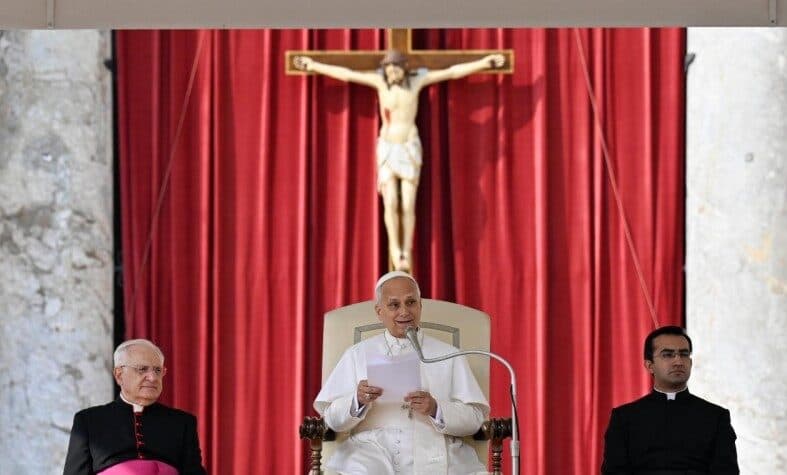Speaking at his weekly Audience, Pope Leo XIV said the life, death, and resurrection of Jesus Christ helps humanity as it faces life’s questions and challenges.
Speaking in St. Peter’s Square, the pope said the “pilgrimage of hope” the Church is taking during the 2025 Jubilee is culminating in the Resurrection of Christ, “to radiate its light of salvation in contact with the current human and historical reality.”
“Our lives are marked by countless events, full of different nuances and experiences. At times we feel joyful, other times sad, other times fulfilled or stressed, gratified or demotivated,” he said.
“We live busy lives, we concentrate on achieving results, and we even attain lofty, prestigious goals. Conversely, we remain suspended, precarious, awaiting success and recognition that are delayed or do not arrive at all,” Leo continued.
He said that in short, “we find ourselves experiencing a paradoxical situation: We would like to be happy, and yet it is very difficult to be happy in a continuous way, without any shadows.”
Leo said people come to terms with their limitations and, “at the same time, with the irrepressible urge to try to overcome them.”
“We feel deep down that we are always missing something,” the pope said.
“In truth, we were not created for lack, but for fullness, to rejoice in life, and life in abundance, according to Jesus’s expression in the Gospel of John,” he continued.
“This deep desire in our hearts can find its ultimate answer not in roles, not in power, not in having, but in the certainty that there is someone who guarantees this constitutive impulse of our humanity; in the awareness that this expectation will not be disappointed or thwarted. This certainty coincides with hope. This does not mean thinking in an optimistic way: often optimism lets us down, causing our expectations to implode, whereas hope promises and fulfils,” Leo said.
He said the Resurrection of Christ is not a simple event of human history, but the event that transformed it from within.
“Let us think about a source of water. What are its characteristics? It quenches thirst and refreshes creatures, irrigates the land, renders fertile and living what would otherwise remain barren,” the pope explained.
“It gives refreshment to the weary traveller, offering him the joy of an oasis of freshness. A wellspring appears as a freely-given gift for nature, for creatures, for human beings. Without water it is not possible to live,” he said.
Leo said Jesus does not bestow upon humanity an answer “from above,” but Christ “becomes our companion on this often arduous, painful and mysterious journey. Only He can fill our empty flask when our thirst becomes unbearable.”
“And he is also the destination of our journey. Without his love, the voyage of life would become wandering without a goal, a tragic mistake with a missed destination,” he said.
“We are fragile creatures. Mistakes are part of our humanity; it is the wound of sin that makes us fall, give up, despair. To rise again instead means to get up and stand on our feet. The Risen One guarantees our arrival, leading us home, where we are awaited, loved, saved,” the pope said.
“To journey with him means to experience being sustained despite everything, to have our thirst quenched and to be refreshed in the hardships and struggles that, like heavy stones, threaten to block or divert our history,” he said.
Follow Charles Collins on X: @CharlesinRome














